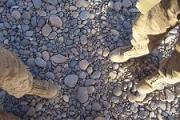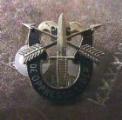I flew medevac in Northern Helmand June-November. The guys liked the following idea. My boss added that subsidizing soybeans would deny them the cornfields as cover.
Rather than turn it into a giant thesis (I've looked into all the details about wood for fuel, etc.) I tried to see how few words I could put it in.
Seeing that you could start with one dozer and a truckload of fencing and irrigation pipe, it would be easy to test. I know the exact tree line to start with.
Plowing Over the Taliban
We overlooked why the Taliban are so entrenched – it’s the trenches. Afghanistan is wasteland except for a 5 kilometer wide ribbon of antiquated overgrown irrigation trenches and mud walls. Any soldier will tell you, the denser and wider the web, the thicker the bullets. This war costs $18,000 an acre, annually.
Each troop removed could buy a million feet of wire fence or irrigation pipe. The lead should be the USDA, not the USMC. Afghanistan’s green belt could be cleaner than Kansas. The farmers would love us. Hunting the Taliban would become unsporting.
Robert Haston, LtCol, 920th Rescue Wing












Bookmarks